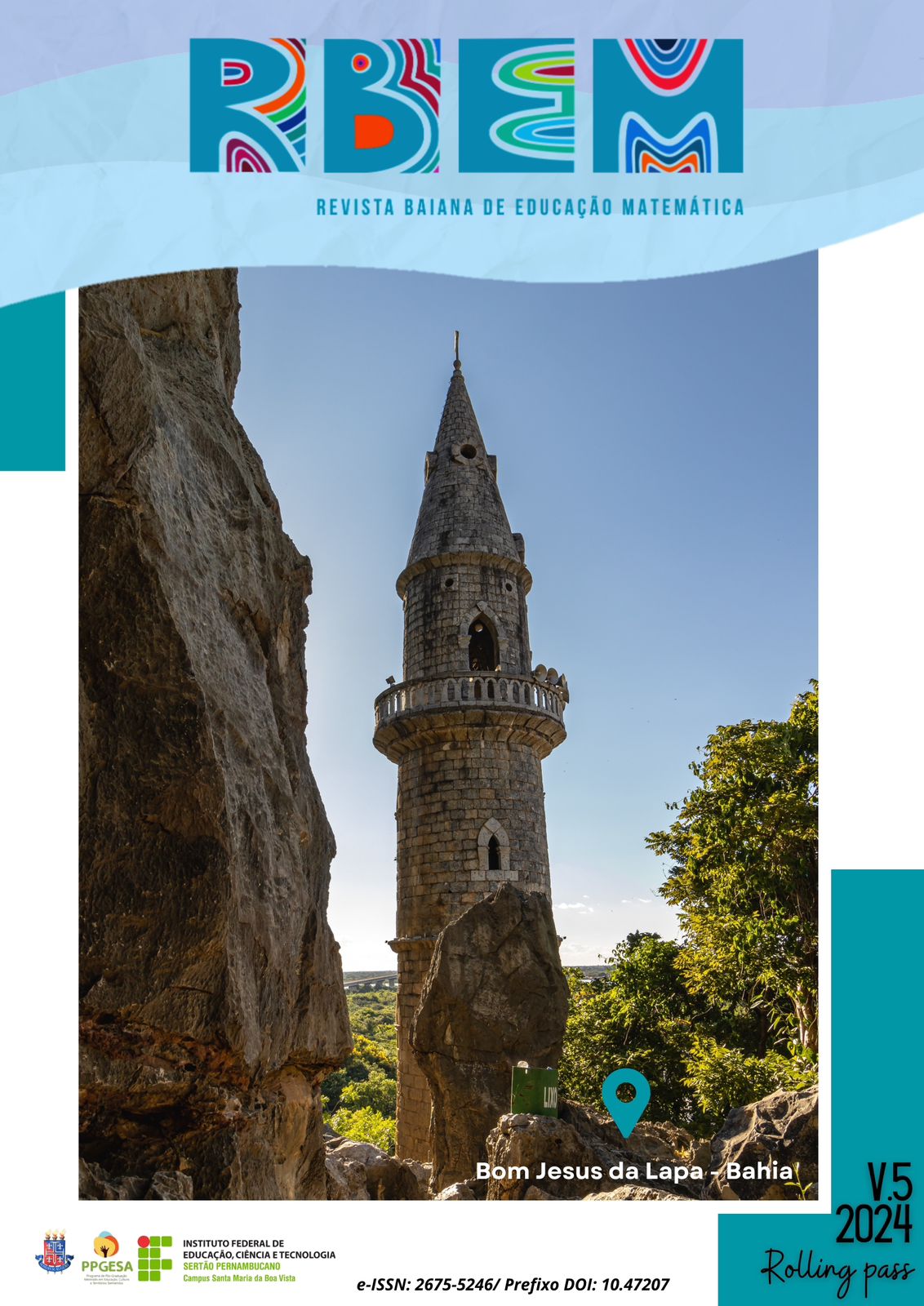Integrative facet of the PROFMAT Problem Solving curricular component at the Federal University of Western Bahia: A quantitative analysis
Main Article Content
Abstract
This article presents the integrative facet of the Problem Solving curricular component of the PROFMAT master's degree at the Federal University of Western Bahia in relation to the other curricular components. Through a study of students' academic performance, we measure its relationship with the other components, and whether there is causality. We carry out a descriptive analysis, followed by an inferential analysis to compare average earnings and present statistical regression modeling assuming the Problem Solving component as the response variable and the other components as explanatory variables, to detect which components actually explain your performance and its integrative character in the context of the curricular matrix. The database was obtained via request to PROTIC-UFOB without the students' nominal identification. Regarding the results, the descriptive analysis showed that the Educational Assessment curricular component presented the highest average performance and the lowest variability (Coefficient of Variation: CV=3.2%) and the Probability and Statistics curricular component presented the lowest average performance and the greater variability (Coefficient of Variation: CV=26.3%). Regarding inferential analysis through analysis of variance (ANOVA), we found that there is a significant difference between the average yields of the curricular components taught in PROFMAT-UFOB (p-value < 0.05). Within the scope of statistical regression modeling, the curricular components that, in fact, contribute or influence the academic performance of the Problem Solving component are two (i) Discrete Mathematics and (ii) Real Numbers and Functions, characterizing the current integrating facet of the component.
Downloads
Article Details

This work is licensed under a Creative Commons Attribution-NonCommercial-ShareAlike 4.0 International License.
Uma nova publicação de artigo anteriormente publicado na Revista Baiana de Educação Matemática, fica sujeita à expressa menção da precedência de sua publicação neste periódico, seguindo as normas de referência. Autores que publicam na RBEM concordam com os seguintes termos:
-
O Conselho Editorial se reserva ao direito de efetuar, nos originais, alterações de ordem normativa, sintática, ortográfica e bibliográfica com vistas a manter o padrão culto da língua, respeitando, porém, o estilo dos autores. As provas finais poderão ou não ser enviadas aos autores.
-
Autores mantém os direitos autorais e concedem à revista o direito de primeira publicação, com o trabalho simultaneamente licenciado sob a Licença Creative Commons Attribution (CC BY-NC-SA).
-
Autores têm autorização para assumir contratos adicionais separadamente, para distribuição não-exclusiva da versão do trabalho publicada nesta revista, exemplo: publicar em repositório institucional ou como capítulo de livro, com reconhecimento de autoria e publicação inicial na RBEM.
-
Autores têm permissão e são estimulados a publicar e distribuir seu trabalho online — em repositórios institucionais, página pessoal, rede social ou demais sites de divulgação científica.
References
BALL, D. L. Bridging practices: Intertwining content and pedagogy in teaching and learning to teach. Journal of Teacher Education, Michigan, v. 51, [s.n.], p. 241-247, 2000.
BALL, D. L. Knowing Mathematics for Teaching: Relations between Research and Practice. Mathematics and Education Reform Newsletter, v. 14, n. 3, p. 1-5, 2002.
GIL, A. C. Métodos e técnicas de pesquisa social. 6ª ed. São Paulo: Atlas, 2008.
GODINO, J. D. Categorías de análisis de los conocimientos del profesor de matemáticas. Unión, Revista Iberoamericana de Educación Matemática, [S.l.], [s.v.], n. 20, p. 13-31, 2009.
Disponível em: https://union.fespm.es/index.php/UNION/article/view/1063/752
Acesso em: 04 de março de 2024.
HOCKING, R. The Analysis and Selection of Variables in Linear Regression. Biometrics, v. 32, n. 1, p. 1-49, Washington, 1976.
HOSMER, D. W., LEMESHOW, S. Applied Logistic Regression. John Wiley, New York, 2000.
IMBERNÓN, F. Formação continuada de professores. Porto Alegre: Artmed, 2010.
IMBERNÓN, F. Formação docente e profissional: formar-se para a mudança e incerteza. 6ª ed. São Paulo: Cortez, 2011.
LARSON, R., FABER, B. Estatística Aplicada. Editora Pearson Hall, 4ª Edição, São Paulo, 2010.
MORETTIN, P. A., BUSSAB, W. O. Estatística Básica. São Paulo. Editora Saraiva, 10ª Edição, 2024.
NACARATO, A. M. A Formação do Professor de Matemática: pesquisa x políticas públicas. Contexto e Educação, Ijuí, Ano 21, [s.v.], n. 75, p. 131-153, jan./jun, 2006.
Disponível em:
https://www.revistas.unijui.edu.br/index.php/contextoeducacao/article/view/1114
Acesso em: 04 de março de 2024.
PASSOS, C. L., NACARATO, A., FIORENTINI, D., MISKULIN, R. G., GRANDO, R. C., GAMA, R., MEGID, M. A., FREITAS, M. T., VIEIRA DE MELO, M. Desenvolvimento profissional do professor que ensina matemática: uma metaanálise de estudos brasileiros. Revista Quadrante, Lisboa, v. 15, n. 1-2, p. 193-219, 2006. Disponível em: https://quadrante.apm.pt/article/view/22800/16866
Acesso em: 04 de março de 2024.
R Development Core Team. R: A Language and Environment for Statistical Computing. R Foundation for Statistical Computing, Vienna, Austria, 2018. ISBN 3-900051-07-0.
SERRAZINA, M. L. M. Conhecimento matemático para ensinar: papel da planificação e da reflexão na formação de professores. Revista Eletrônica de Educação, São Carlos, v. 6, n. 1, p. 266-283, maio 2012.
SILVA, C. R. O. Metodologia e organização do projeto de pesquisa: guia prático. Editora CEFET, Universidade Federal do Ceará, 2004.
VERGARA, S. C. Projetos e Relatórios de Pesquisa em Administração. 16. ed. São Paulo: Atlas, 2016.
ZEICHNER, K. M. A formação reflexiva de professores: Ideias e práticas. Lisboa: EDUCA, 1993.
ZEICHNER, K. M. Uma análise crítica sobre a “reflexão” como conceito estruturante na formação docente. Educação e Sociedade, Campinas, vol. 29, n. 103, p. 535-554, maio/ago. 2008.

